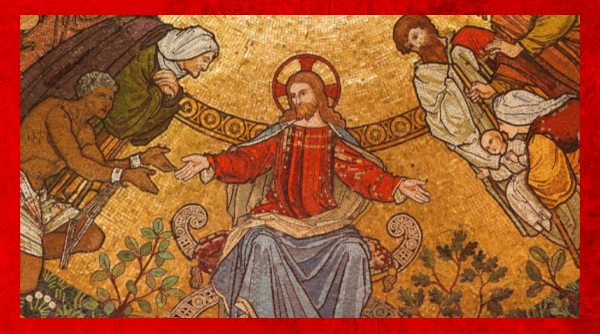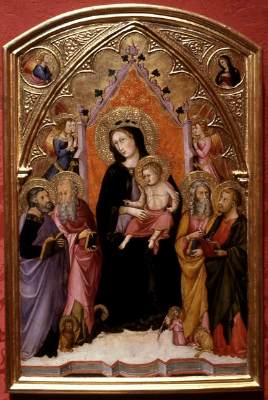The School of Nazareth

The basis for determining the value of human work is not primarily the kind of work being done but the fact that the one who is doing it is a person… it is always man who is the purpose of the work.
–Saint John Paul II, On Human Work
Each September kicks off with Labor Day weekend, a holiday in which we honor the achievements of our hard-working Americans. Our workplace is our mission field to which we bring our Eucharistic selves to glorify the Lord with our lives (from the dismissal of the mass). Unfortunately, the ever-increasing hostility towards Christians, particularly Catholics, makes this difficult. We must be prepared for our ‘white martyrdom’, that is, the martyrdom of witness.
We begin by unravelling dignity from identity. Too often our success is measured (by ourselves and others) based upon the income earned, level achieved within the organization’s hierarchy, or the power and prestige held in the position. We wrongly absorb these factors as integral to our identity. Work at all levels and of all types has dignity as we contribute in some way to our own well-being and that of society. “[W]e ought not to be so much concerned with what we do as with what we are, for the value of our deeds will depend upon what we are in ourselves. Therefore St. Francis de Sales said that a great saint can merit more in a lowly occupation than can an imperfect man in the most noble and glorious works” (Servant of God John Arintero)[1]. It is important to recognize the dignity of work but also that it is God who gives us our identity.
The one who, while being God, became like us in all things devoted most of the years of his life on earth to manual work at the carpenter’s bench. This circumstance constitutes in itself the most eloquent “Gospel of work.”
–Saint John Paul II, On Human Work
With a growing understanding that we, and our colleagues, have been made to grow in the likeness of God in part through our work which dignifies us, our perspective of work and the workplace can shift to see it with God’s eyes. The Son of God in His poverty served those wealthy enough to pay for his carpentry services. He was at their mercy and willingness to pay a fair price; He suffered customers with difficult personalities and demands. His example shows us that, although work itself may at times be monotonous, when done with love is never boring nor tedious. After all, originally work gave man purpose. It only became a drudgery after Adam’s sin. And in our Lord’s great wisdom, embracing work strengthens our character and grows us in virtue. This is why the saints teach us to offer every task in honor of Him—in doing so, we also contribute good to the world and to the body of Christ. What may have looked like a punishment due to Adam’s sin (Genesis 3:19) is actually an opportunity for grace and love.
All of creation glorifies God by its existence as it provides a peek into His power, beauty, and majesty. Only we, however, can choose by our will to glorify Him in our thoughts and deeds. Our proper use of creation brings it into service of God when we intentionally choose so. In this way, we are being more fully human. If we allow Him, our labor is one manner in which He will perfect and sanctify us. Begin each day joining Jesus in His ‘school of Nazareth’, endeavoring for your work to be a means of learning more about Him and yourself. At the end of the day, examen it with Jesus asking Him to show you the beauty and value in all that has taken place, even (and especially) the work or workplace relations in which love and joy seemed absent. Then sit in silence with Him and allow Him to fill your soul with the healing grace that will prepare you for the next day’s ‘lesson’.
Work is a good thing for man–a good thing for his humanity–because through work man not only transforms nature, adapting it to his own needs, but he also achieves fulfillment as a human being and indeed, in a sense, becomes “more a human being.”
–Saint John Paul II, On Human Work
Ad Majorem Dei Gloriam 😊
(Image by Luis Quintero from Pexels
[1] Servant of God John Arintero OP. (1949) The Mystical Evolution, Volume 1. B. Herder Book Co. obrascatolicas.com/livros/Teologia/J%20G%20Arintero%20OP%20-%20The%20Mystical%20Evolution%20vol%20I.pdf

Thank you for caring and sharing appropriately...
Consecrated to the Sacred Heart of Jesus through the Immaculate Heart of Mary. Except where noted, all design, writing and images ©2024 by Debra Black and TheFaceofGraceProject.com. All Rights Reserved. No part of this website may be reproduced, distributed or transmitted in any form or by any means, including downloading, photocopying, recording, or other electronic or mechanical methods, without the prior written permission of the publisher, except in the case of brief quotations embodied in critical reviews and certain other noncommercial uses permitted by copyright law. For permission or to report violations please email: thefaceofgraceproject@gmail.com
